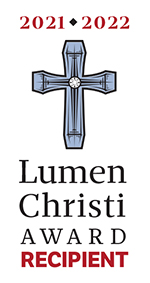
The light of Christ shines in all corners of the world—even in places where, during the long, cold stretches of the wintertime, the sun barely emerges above the horizon.
Father Stan Jaszek is the bearer and witness of that light among the Native Alaskans he serves in the Diocese of Fairbanks.
He speaks in a humble, soft-spoken manner, but in his eyes and words are the clear convictions of an experienced missionary who has served diverse communities across the globe.
Catholic Extension Society is honored to name Father Stan Jaszek as our 2021-2022 Lumen Christi Award recipient.
This award is Catholic Extension Society’s highest honor, and it is given to people who radiate and reveal the light of Christ present in the communities where they serve.
A missionary priest from Poland, Father Jaszek is one of just a handful of priests ministering in the geographically largest diocese in the United States. Catholic Extension Society has supported the Catholic presence in Alaska since our founding and continues to provide funding to ensure the future of this ministry.
Click and scroll on the map to view the area where Father Jaszek serves.
Father Jaszek’s impact in the Alaskan villages he serves is immensely powerful in the hearts of the people. This is due, in part, because he has given his own heart to them. Years before Pope Francis said that a pastor should smell like his sheep, Father Jaszek was living out that vision.
A true missionary priest, he embraced the lifestyle of the Yup’ik people he serves to better understand their reality and more effectively communicate the Gospel.
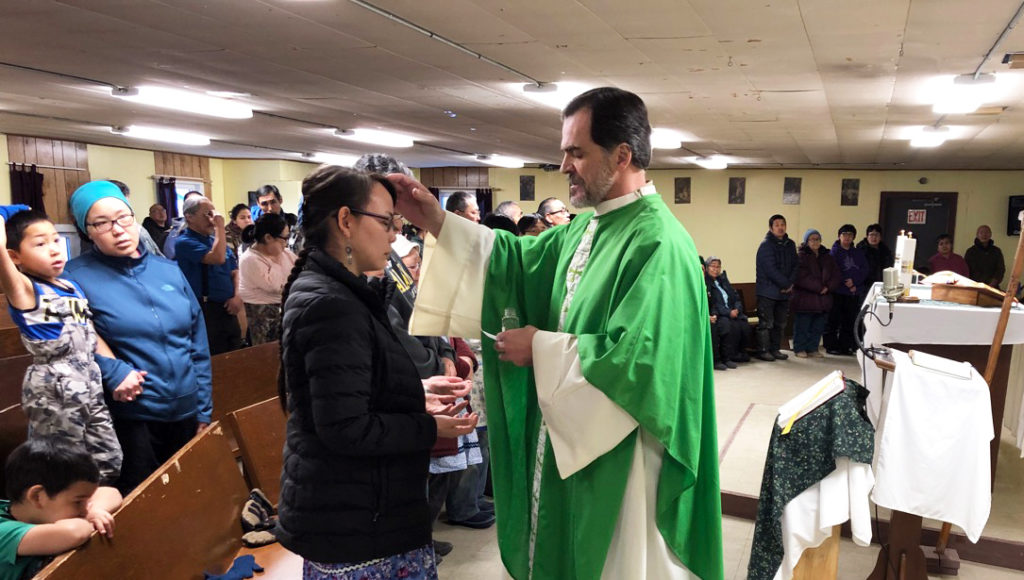
He has carried out his mission across four continents—amid political and social upheaval and in the blistering sun and bitter cold. He has dedicated his life to delivering Christ’s message to the ends of the Earth, literally.
Drawn to the missions
Father Stan Jaszek grew up in Poland under Communist rule. As a teenager, he felt called to serve in the missions. Unfamiliar with missionary religious organizations, he applied to his local diocesan seminary.
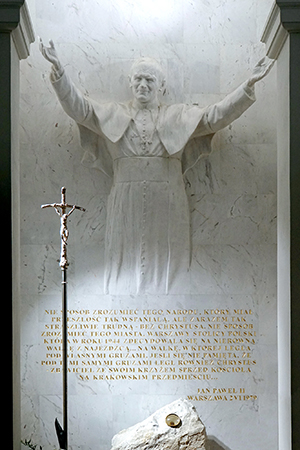
During his time of formation for the priesthood, the Solidarity movement in Poland strengthened. Polish citizens, grounded in their faith and desire for independence, worked to demolish the oppressive communist government.
The movement was greatly inspired by the groundbreaking visit by the newly elected Pope John Paul II in 1979, returning to his Polish homeland.
“The Church was the only force that was able to contradict the lies that communism spread about the dignity of workers, about the value of work, about the freedom of the people, about the right to choose their leaders,” Father Jaszek said. “The Church was actually the place where people could feel free.”
This time in his life imparted wisdom he carries today.
He said,
Seeing Polish Catholics overcome communism—mostly through prayer—taught me that God works gently, and change takes time, but grace always brings forth positive results.”
Soon after his ordination in 1988—a year before communism fell in Poland—he was invited to visit Peru by a priest who had started a new mission serving indigenous people in the Andes mountains. His two-month visit stretched into half a year due to the local political situation.
Yet the tough conditions and precarious circumstances did not deter him. Rather, his time there as a young priest confirmed his other calling within his priestly vocation. Upon his return to Poland, he asked his bishop for permission to work long-term in the missions.
Initially he sought to serve in another Spanish-speaking country to avoid learning a new language again. However, the life of a missionary brings surprises at every turn.
A friend convinced him to take over his mission work among several tribes in South Africa. Father Jaszek began studying in the English and Zulu languages and arrived shortly after the end of apartheid.
During this time of great joy and hope, many problems also persisted. He served one primary faith community and traveled between 14 villages on his own.
“Working in South Africa demanded me to develop far-reaching independence,” said Father Jaszek. “That was the most important development in my personality—to become fiercely independent or resourceful without expecting much help.”
After eight years, he felt in need of a change. He joked to his visiting cousin that he might go somewhere completely different, like Alaska.
Soon, a book about the state arrived in the mail, courtesy of his relative. He felt drawn to the vast, foreign land and sent a letter to the bishop of Fairbanks. He received a prompt reply welcoming him to begin the next chapter of his missionary life.
Immersed among the Yup’ik
Unlike the Alaska known to most tourists who visit the state, the area served by Father Jaszek is a different reality altogether.
The Yukon–Kuskokwim Delta region, inaccessible by roads, is located along the Bering Sea. It is largely a tundra landscape: low and flat with tiny vegetation. The land is interwoven with countless streams, lakes, marshes and the immense Yukon River.
These prevalent waterways prevent the development of any major roads.
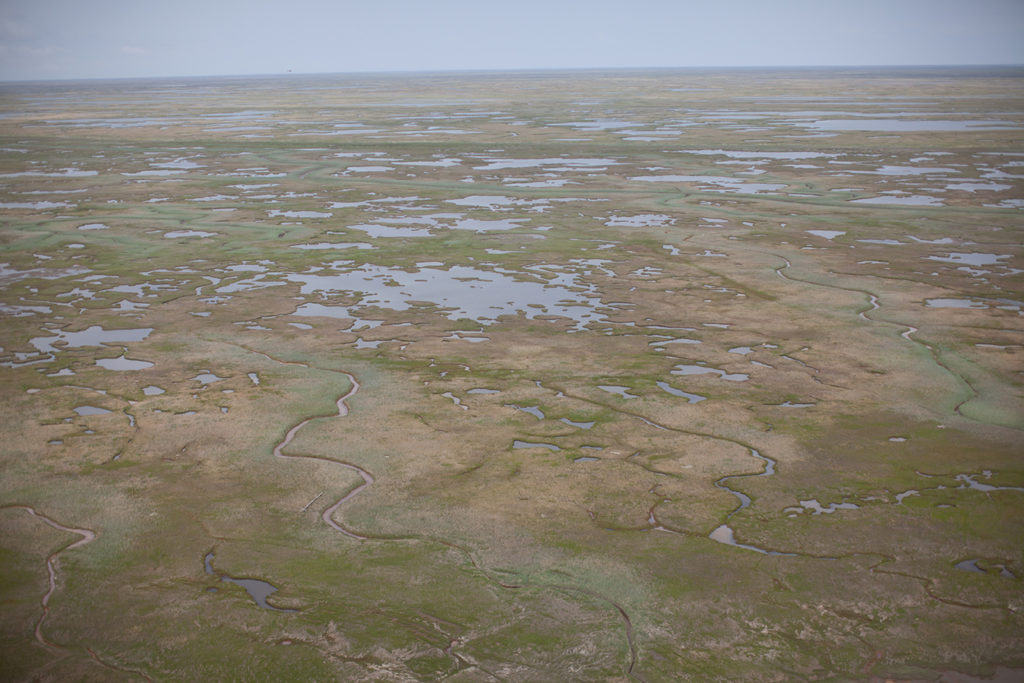
This is the home of the Yup’ik people. These Native Alaskans have lived in this corner of God’s creation for 10,000 years.
The Yup’ik mostly survive on a subsistence lifestyle—living on what the land and sea offer. It is much the same food that their ancestors thrived on for thousands of years. The diet is healthy, consisting of fish and arctic animals such as seals, beavers or moose. People also grow vegetables, and forage for berries.
Father Jaszek arrived in 2002 to start his mission, but first had to learn how to survive. Finding food in most of the remote villages scattered around an unfamiliar wilderness is not as simple as driving to pick up groceries. There are few stores, and no guarantee they will be stocked.
Out of the diocese’s 46 parishes, only nine are accessible by road.
His first assignment was in the village of Stebbins, just north of the region he currently serves. He asked the local Yup’ik people to teach him how to survive.
He learned how to hunt, fish, forage for berries and how to plan ahead and prepare in an area with unpredictable weather events.
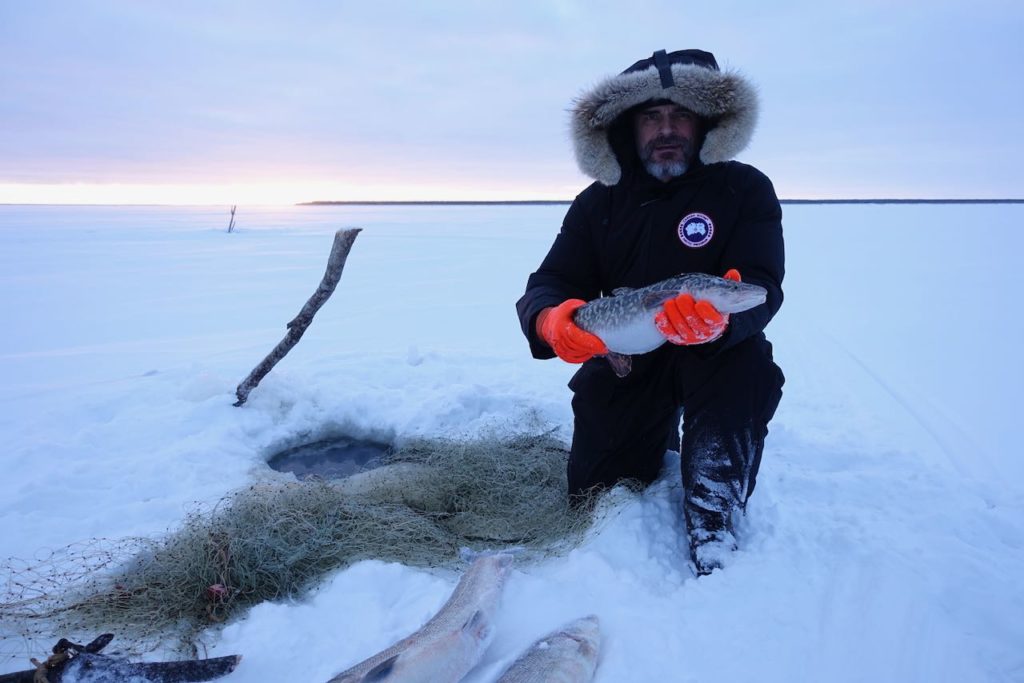
Severe cold—he experienced temperatures plunging as low as 58 degrees below zero—and days upon days of winter storms have tested his fortitude (not to mention his food supply).
Father Jaszek says it is only natural to learn about and join his flock in their way of life.
This is in line with the teachings of the Catholic faith, which recognizes that every person is created in the image and likeness of God and therefore reveals something of the inexhaustible beauty of our creator.
“We shouldn’t be afraid to let people live differently or express our Catholic faith in a different way,” Father Jaszek said. “Because if humanity teaches us anything, it’s that God likes variety.”
Getting closer to his people and their daily experiences, Father Jaszek believes, is the best way to preach and teach.
He said,
Jesus in His ministry told the stories that were very familiar to the people that He talked to. They were stories that they experienced every day. If I experience the lifestyle of the people, I hope that I will be able also to dress my stories into the everyday experiences of the people.”
He continued, “The challenge of proclaiming the Gospel is not only to read the Gospel and to repeat it as written in the New Testament, but also to give some kind of an indication: How can it be lived? How can it be kept? And that cannot all be done properly without truly experiencing the life that people live there.”
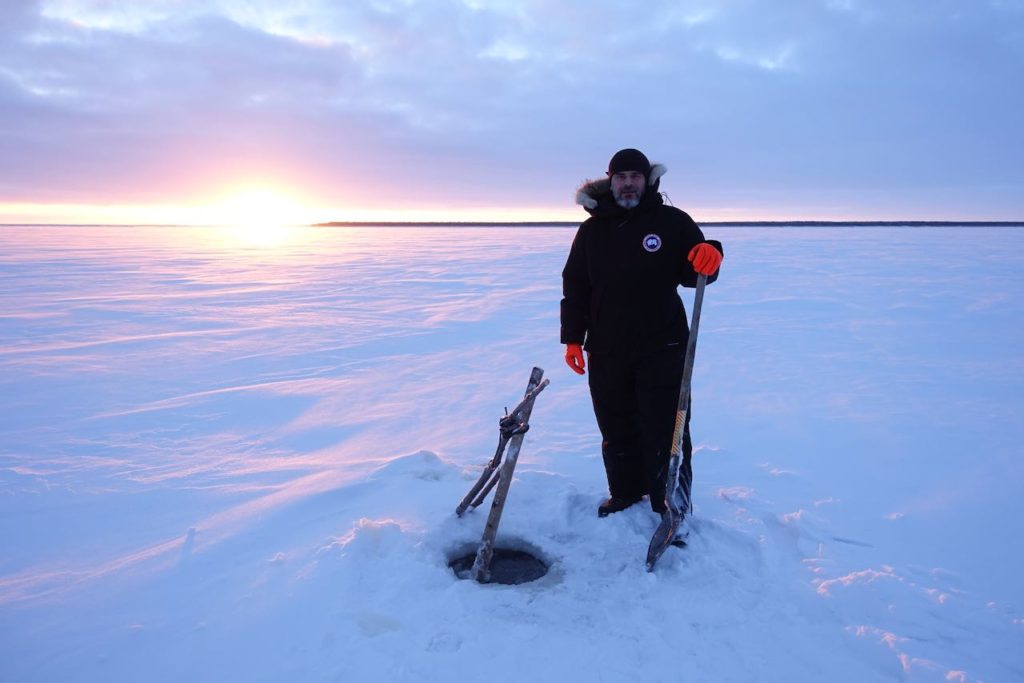
Deacon Francis Peter served in Stebbins alongside the resilient pastor. “Father Stan has been good for our communities because he wants to live the way we live—close to nature,” he said.
Out of his 19 years of missionary work in the Diocese of Fairbanks, Father Jaszek has spent 14 of them living among the Yup’ik.
He is currently in his third year serving four parishes located along the mouth of the Yukon River: Sacred Heart in Emmonak, St. Ignatius in Alakanuk, St. Joseph in Kotlik and St. Peter in Nunam Iqua. Catholic Extension Society’s donors have supported each of these faith communities for many years.
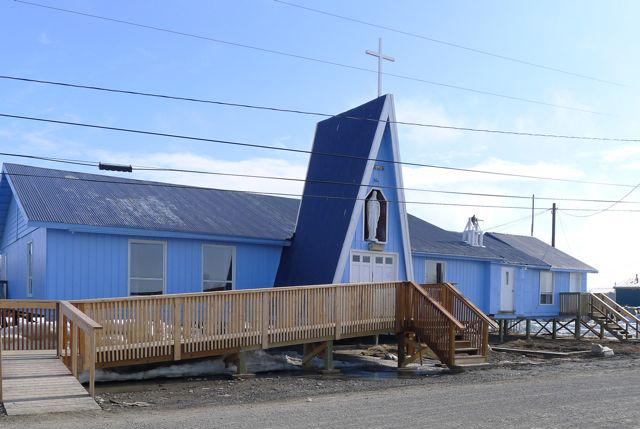
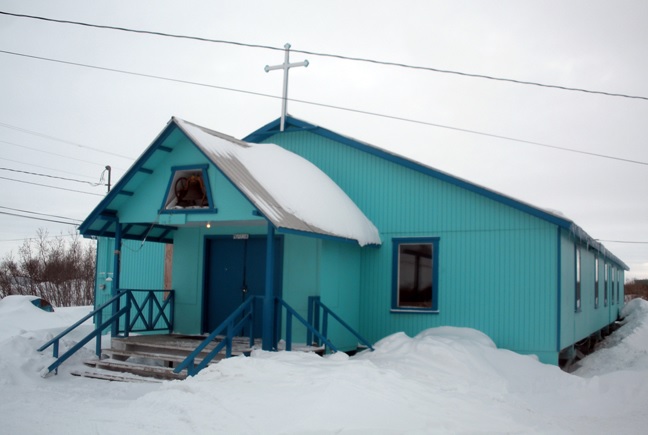
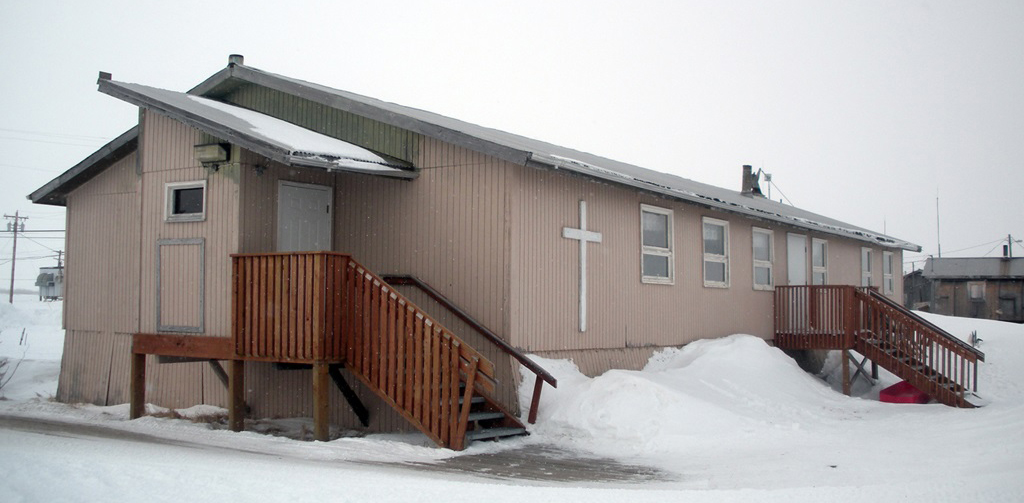
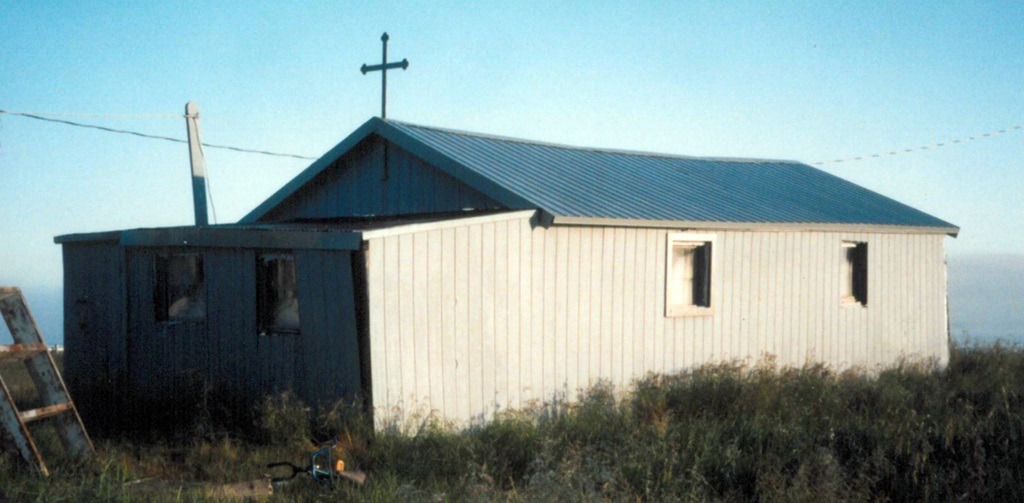
Father Jaszek joins in the communal life that is essential means of survival among the Yup’ik.
Mary Ayunerak, a parish administrator in the village of Alakanuk, said, “Native people are very generous and share what they have with others. Father Stan is like that, too. He gives away extra fish or meat to help take care of villagers who don’t have as much.”
She continued,
He’s got a Yup’ik heart, and that’s why he gets along so well with our people.”
Father Jaszek sometimes faces risks in this wilderness. In addition to being the source of much of his food, the Yukon River is also his expressway.
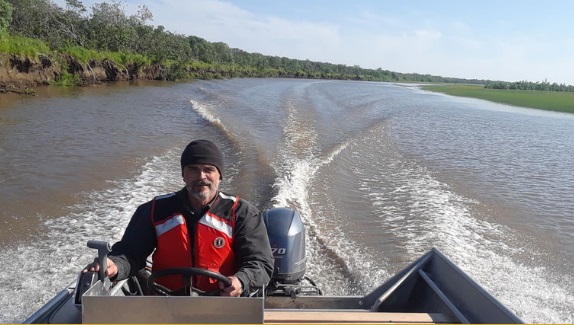
Using the very fuel provided by Catholic Extension Society support, he travels along it by boat in the summer and by snowmachine in the winter.
The in-between seasons, however, can be treacherous as ice begins to form or melt. The Yup’ik taught him how to discern if the ice was safe to ride on, but learning to navigate the rivers takes experience—sometimes by trial and error.
On one night, for example, while traveling by snowmachine, he suddenly started to sink. A warm spell had melted part of the ice during the day. Half-submerged, he barely managed to escape the frigid water with the vehicle.
Once his vehicle nearly broke down in 30 below zero weather, almost stranding him in the wilderness. Another time on a visit to one of the villages, a passerby informed him that he was being stalked by a bear.
He shrugs off these experiences as part of the job and remains unwavering in his commitment to the people.
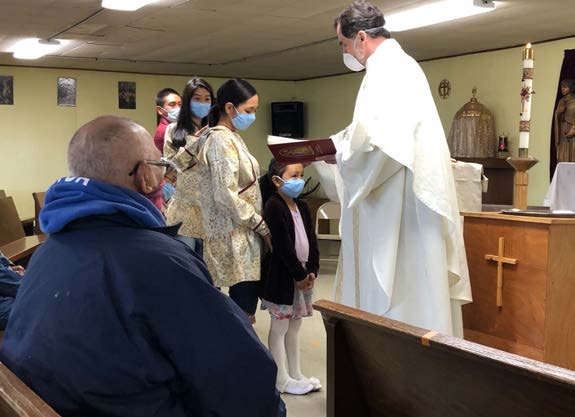
He has learned much more than how the people live physically. He has learned what sustains them spiritually. The Yup’ik—as many indigenous people do—already believe that all living things and objects possess a distinct spiritual entity.
As Jesuit poet Gerard Manley Hopkins put it, “The world is charged with the grandeur of God.”
Understanding this heightened Father Jaszek’s perception of God’s presence in the world. “That spirit-filled reality is the thing I gained,” he said of the Yup’ik. “Everything is permeated by God.”
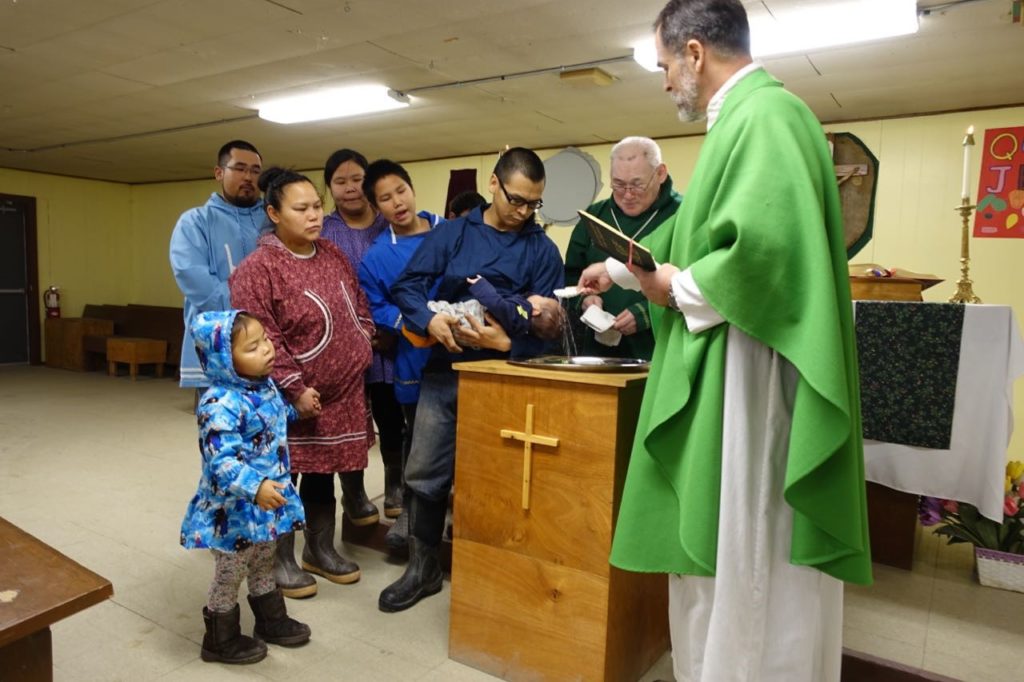
He incorporates this perspective and other aspects of Yup’ik culture into his ministry. He includes their hymns and drumming in Mass, and introduces saints, devotions and liturgical practices that resonate with the people.
“Father Stan brings to his ministry a strong sense of his priestly vocation,” said Patrick Tam, the director of adult faith formation and a parish facilitator for Sacred Heart Church in Emmonak. “What occupies his mind and heart is the desire to bring people closer to God through the word and sacraments. In turn, the people have brought him closer to nature. Father Stan exemplifies a trait that all missionaries should hone—the willingness to be taught by the very people who call this land their home.”
Spiritual care in hard times
The faithful cherish Father Jaszek’s presence in this region.
Despite their continued subsistence lifestyle, the ways in which people live are drastically different compared to just a few generations ago, when people still maintained a nomadic lifestyle, moving to different camps depending on the season.
They have been pushed into a more Western lifestyle, living in one place and encountering the world through new media and technology faster than they can grow accustomed to it.
Many people struggle with their mental and spiritual well-being. Sadly, suicide rates are high.
In villages with only a few hundred people, the tragedy of suicide creates deep wounds. Father Jaszek believes faith brings comfort and stability to those he serves. Although their world is changing rapidly, he seeks to ensure that God’s love remains a constant in their lives.
“It’s the same spirit that’s mentioned in the Book of Genesis in the very first verses. That same spirit, creative spirit, brought order out of chaos and that same spirit brings order and happiness also into the lives of people,” he said.
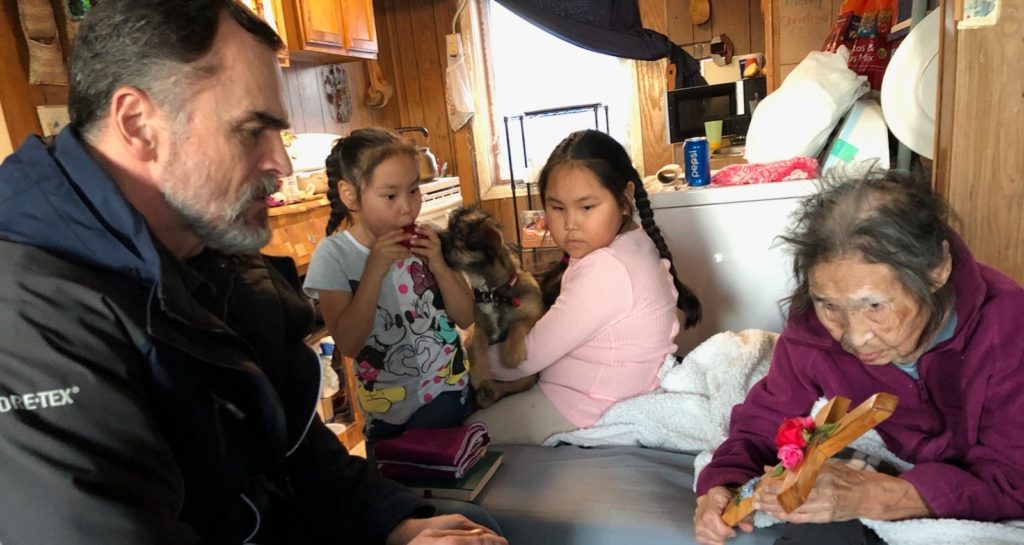
“If you’re going through a hard time, you know Father Stan is going to be there for you—to listen, to give advice and to pray and share the scriptures with you,” said Ayunerak, the parish administrator in Alakanuk. “And he never rushes through. He takes his time with people, whether it’s just talking or celebrating a funeral. We appreciate that.”
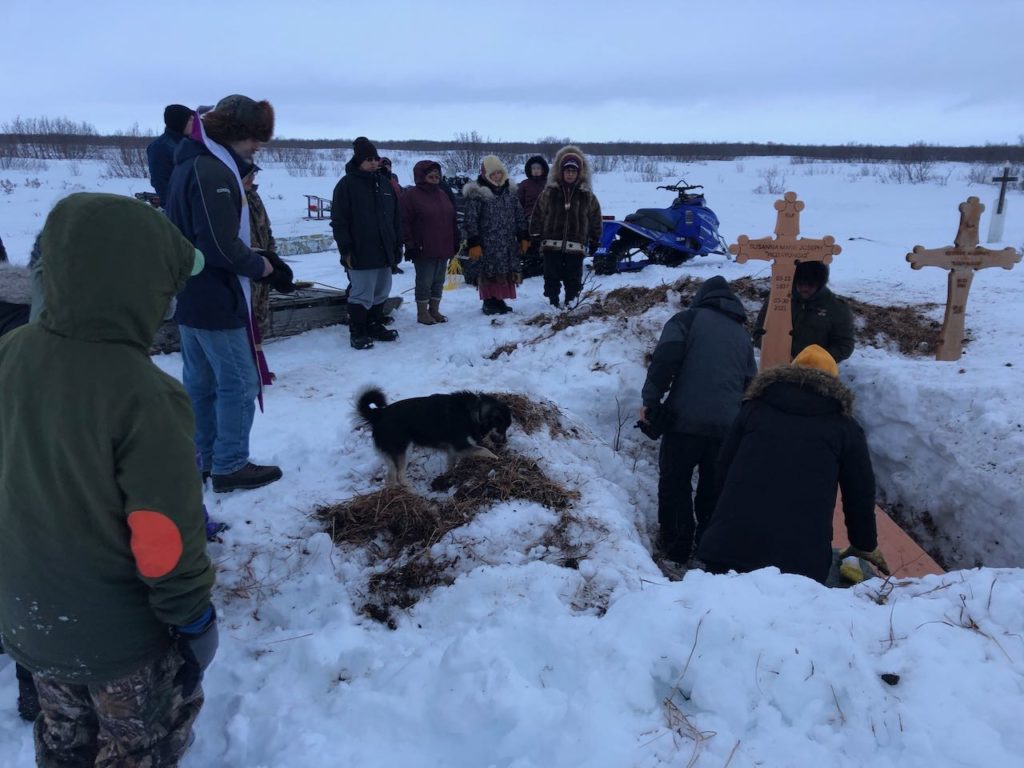
This spiritual care was desperately needed during the darkest days of the pandemic. In this region, entire villages were wiped out by the 1918 flu. So, when COVID-19 arrived, all in-person services and travel shut down very strictly.
Falling victim to the virus is especially dangerous in an area without easily accessible hospitals. On top of this, the pandemic disrupted the fishing season, primary income for the people.
Father Jaszek said it was not unusual to spend four or five hours a day counseling people over the phone.
When funerals were not permitted, he supported bereaved families by praying with them outside their homes and at gravesites, often in exceptionally cold temperatures. In these conditions, remains cannot be buried, because the ground is frozen solid.
In one remarkable feat at the beginning of the pandemic, Father Jaszek walked 22 miles round trip in the snow on Palm Sunday to deliver blessed palms to the faithful in Alakanuk. The people were feeling very isolated and cut off from their faith—streaming Mass online is not a feasible alternative in these parts.
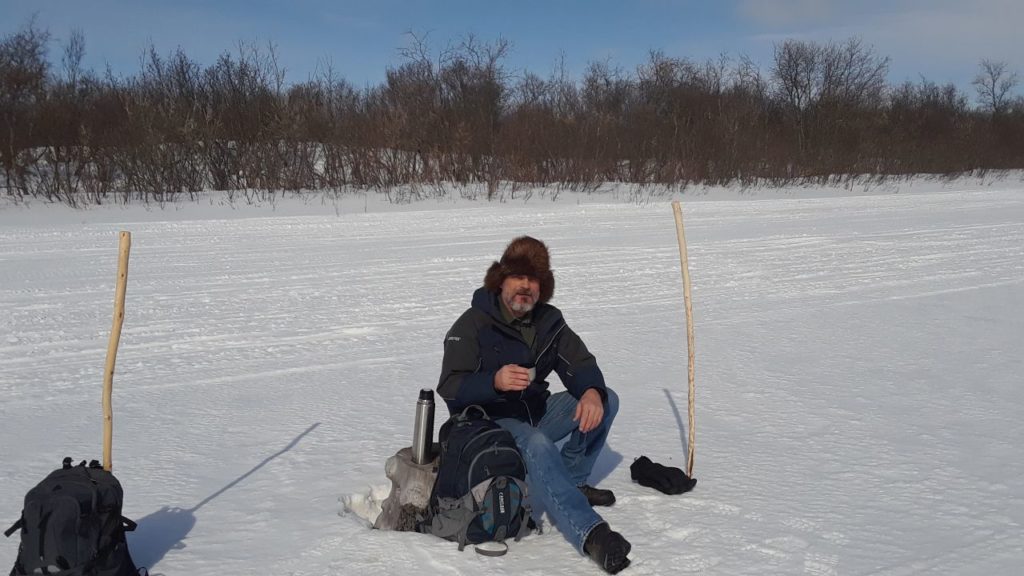
“The Yup’ik people are deeply rooted in nature, so they intuitively understand the connection between the physical and the spiritual world,” said Father Jaszek.
“That’s why sacramentals are important to them, because they get that the physical world can be a conduit for grace. I brought them the palms because I knew they would appreciate having something tangible to focus on while they were praying during Holy Week.”
A transformative ministry
Ever humble, Father Jaszek provides credit to the deacons, lay leaders and volunteers who take up much of the responsibility in an area with so few priests.
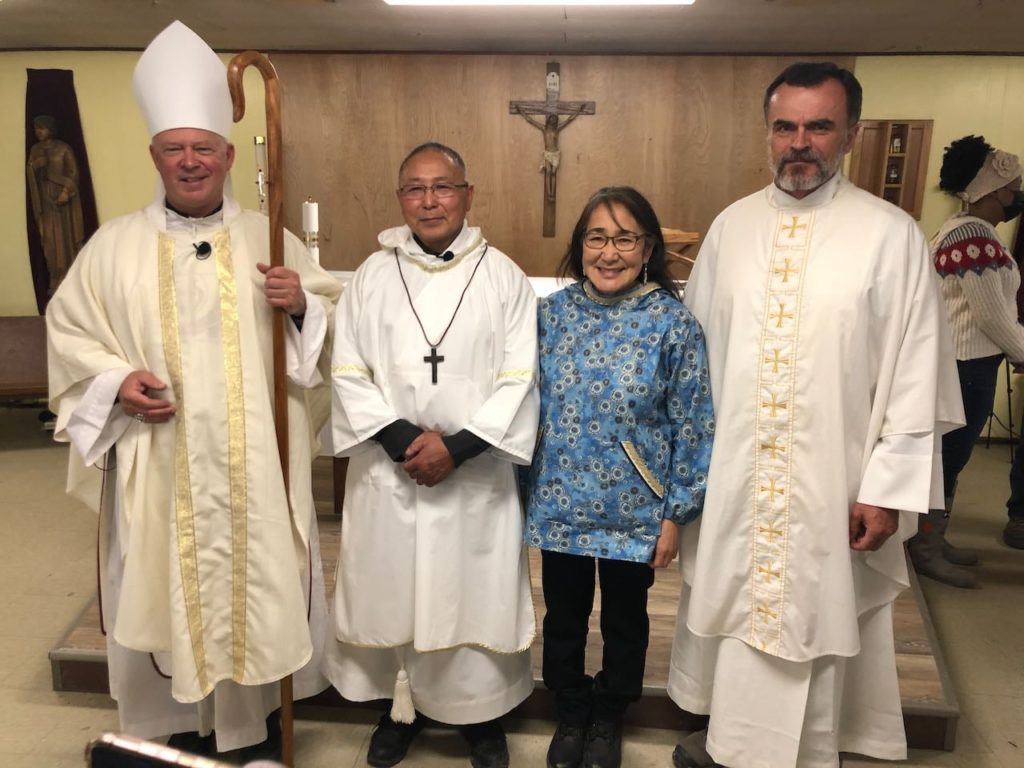
In turn, the diocese’s respect and appreciation for this humble shepherd is indisputable.
“Father Stan deserves the Lumen Christi Award not just because he has dedicated his entire priestly life to serving marginalized children of God, but because his approach to sharing the Gospel with them truly reflects the spirit of Christ himself: he immerses himself in indigenous people’s way of life to demonstrate his love for them and invite them into a closer relationship with God,” said Bishop Chad Zielinski of the Diocese of Fairbanks.
He continued,
Native Alaskans, both Catholic and non-Catholic, universally hold Father Stan in high regard because they see this and know he affirms their human dignity.”
Margaret Gerhart is a parishioner and volunteer at Our Lady of Sorrows church in Delta Junction, where Father Jaszek spent five years ministering in the interior of Alaska. “Father Stan is the calmest man I have ever met,” she said. “He personifies strength, humility and love of his fellow man.”
Sister Kathy Radich, OSF, who coordinates ministries for the Yukon-Kuskokwim Delta region, likened Father Jaszek’s mission to that of Jesus’ first disciples, many of whom were fishermen.
Jesus said to them, “From now on you will be catching people” (Luke 5:10).
“It has been through learning the ways of the people that he has preached Jesus, lived the Gospel and been present to the lives of so many in the different villages where he has served,” Sister Kathy said. “He has caught men and women for Jesus because of his care for and knowledge of the ways of those he lives and ministers among.”
Father Jaszek is committed to continuing his mission for as long as he can.
“I see the need for God among the people,” he said. “Responding to that need is my strongest motivation.”
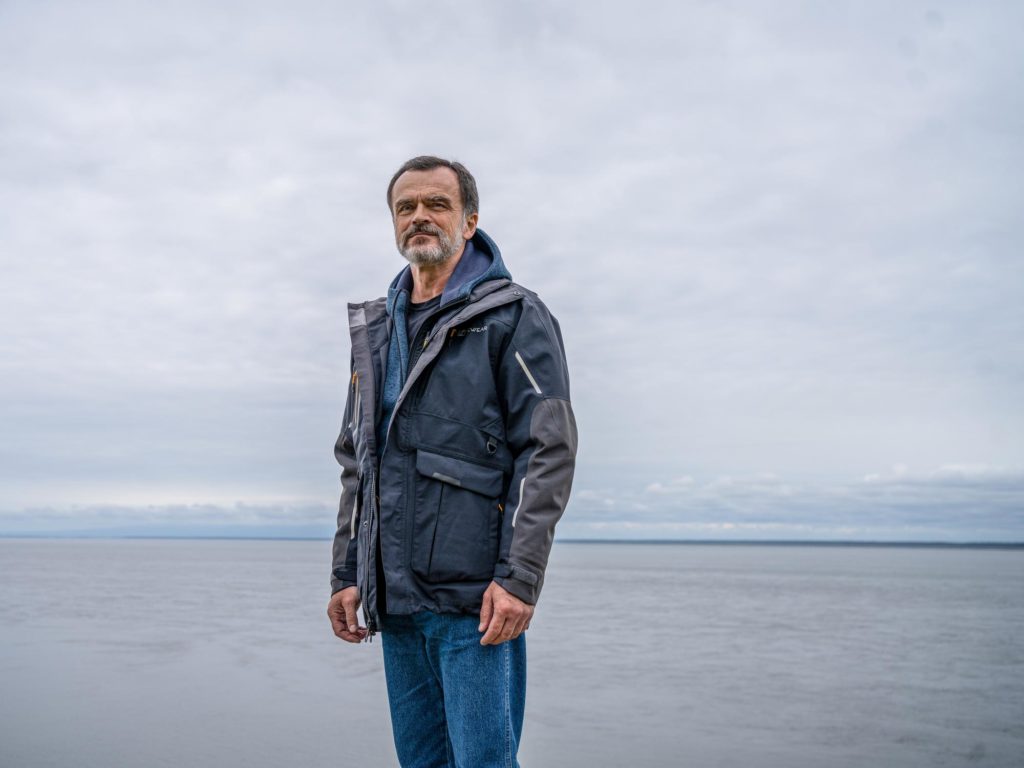
Catholic Extension Society donors should feel proud about how they have contributed to his remarkable ministry. The Lumen Christi Award, with its accompanying $50,000 grant, will continue to support this diocese and exceptional missionary.
Father Jaszek is thankful for our donors, whom he acknowledges are walking alongside him.
By providing the funding for his salary, travel costs, the maintenance of the parishes he serves and more, our donors also serve as missionary disciples, helping the good news to take root everywhere, even in distant and remote regions of the world.


